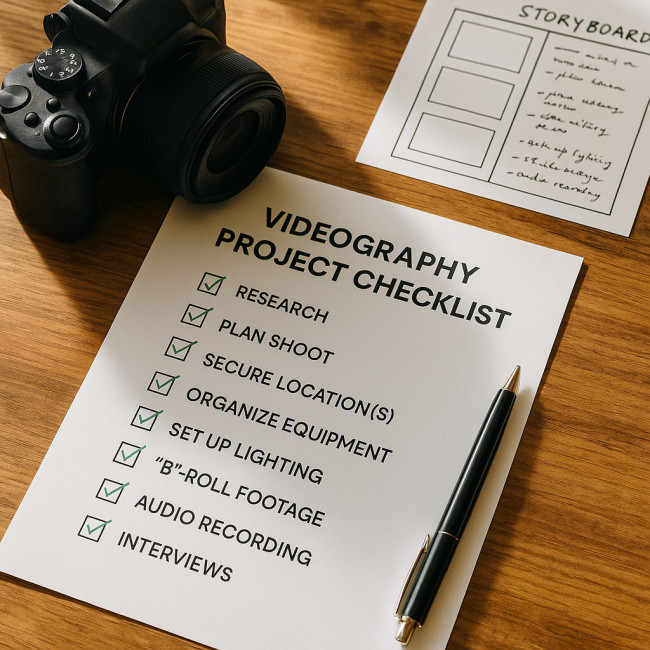Essential clauses for short-term videography contracts with agencies
Signing a one-off or short-term video gig without a watertight agreement is risky for both you and the agency. Below you'll find the ten clauses that protect timelines, revenue, and creative rights—plus a quick quiz, a dispute-data graphic, and a FAQ to help you lock every detail before the first frame is shot.
Why short-term videography contracts need special care

Agencies move fast. They juggle multiple clients, shifting briefs and tight launch windows. A short-term contract—anything from a one-day shoot to a three-week campaign—compresses all the usual production hurdles into a sprint. Clear clauses keep you paid on time, avoid midnight reshoots, and make sure the agency meets its client promises. They also let you focus on what matters: delivering dazzling footage that lands you repeat work and a glowing profile on collaboration-ready videographer listings.
The 10 essential clauses
1. Scope of work
Detail the story arc, shot list, shooting days, crew size and post-production tasks. Ambiguity invites “just one more angle” requests that balloon hours without boosting your fee.
2. Deliverables & formats
Specify resolution, aspect ratios, codecs and platform-ready exports (e.g., 1080p H.264 for social, ProRes 4K for broadcast). Clarify naming conventions and delivery method (cloud folder, agency DAM, hard drive). Reference your proposal brief inside the contract to keep everything aligned.
3. Deadlines & review windows
Short-term projects often launch within weeks. Add calendared milestones: rough cut, first review, final approval. Include “deemed approved” language—if feedback is late, the edit advances automatically.
4. Usage rights & licensing
Define geographic reach, media channels, duration and exclusivity. If the agency needs global, perpetual rights, price accordingly. For shared projects, brush up on how to negotiate usage rights across multiple creators.
5. Payment schedule
Short projects still warrant staggered payments: 40 % on signing, 40 % on principal photography, 20 % on delivery. Tie each instalment to objective milestones, not subjective approval, to dodge endless wait times.
6. Revision rounds
Cap free revisions (e.g., two minor edit rounds). Include an hourly or per-revision fee beyond the cap. This single clause can halve overtime during crunch week.
7. Cancellation & postponement
Set sliding scale fees: 50 % of total if cancelled within seven days, 75 % within 48 hours. For weather-sensitive shoots, add a free reschedule buffer before penalties kick in.
8. Insurance & liability
State which party covers equipment damage, talent injury and public liability. Require the agency to list you as “additional insured” when they arrange cover. For deeper on-set risk tactics, revisit live-shoot risk management.
9. Confidentiality & NDAs
Agencies often handle pre-launch campaigns. A mutual NDA protects the agency's strategy and your proprietary workflow. Spell out penalty figures for leaks.
10. Credits & portfolio usage
Agree on lower-third or end-card credit and the right to post excerpts on your site within 30 days of campaign launch. Link back to the agency whenever possible—those backlinks support local SEO gains.
Quick comparison: payment vs. revision clauses
| Clause | Agency Pain Point | Videographer Risk | Best-practice Wording |
|---|---|---|---|
| Payment schedule | Cash-flow alignment | Late or partial payment | “Invoice due net 10 after each milestone; late fees 2 % per month.” |
| Revision cap | Client unpredictability | Unlimited editing hours | “Includes two rounds of revisions ≤ 60 minutes of edits each.” |
Dispute hotspots: what freelancers report
Source : Freelance Camera Guild 2023
Mini quiz: are your contracts bulletproof?
FAQ
- Can I reuse footage for my showreel if the agency has exclusivity?
- Only if the contract grants you portfolio rights. Add a carve-out that allows 30-second excerpts after campaign launch.
- Is a deposit necessary for one-day shoots?
- Yes. A 50 % deposit secures the date and deters last-minute cancellations.
- What happens if the client delays feedback?
- Include a “deemed approved” clause—if no feedback arrives within 5 business days, the edit moves forward and payment becomes due.
- Do I need my own insurance if the agency provides coverage?
- Maintain your gear and professional indemnity policies. The agency's cover rarely includes equipment you own.
Next steps

Review your current template against the ten clauses above. Update language, set milestone triggers, and double-check liability limits. A contract built on clarity not only shields you legally but showcases your professionalism—helping agencies shortlist you faster than competitors. Ready to streamline? Download a clause-by-clause checklist, share it with your lawyer, and approach your next project with confidence.
Pro tip: Pair a robust contract with strong internal processes like efficient footage repurposing to deliver extra value without extra cost.
Need a refresher before your next negotiation? Bookmark this page and revisit it before every short-term collaboration.











